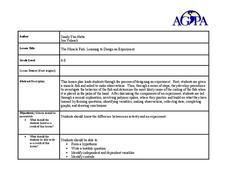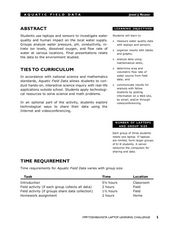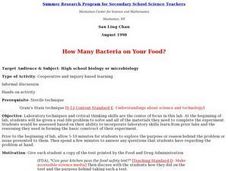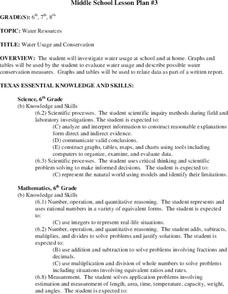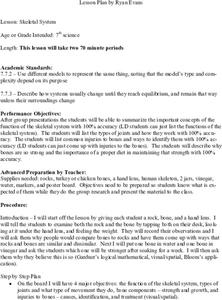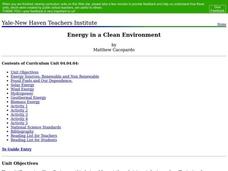Curated OER
Sars
Students discuss the Sars outbreak in 2003. In this biology instructional activity, students research the effect of the outbreak to the world. They create a public announcement about the topic.
Curated OER
Making Blood!
students research blood's components, and use their math skills to recreate a model of whole blood using commonly found food items.
Curated OER
Lessons of the Lorax
Fifth graders read a story that is about the brown pelicans. Then they use the story narrative in order to apply it to the concept of adaptations in different species. The benefits of certain adaptations is examined.
Curated OER
Volcano Demonstration
Students watch a demonstration on how volcanoes work. In this volcano demonstration, students watch the teacher demonstrate a volcanic eruption. The teacher will change variables used to create the eruption and the students will predict...
Curated OER
Problem Based Inquiry Learning
Tenth graders research Nuclear Energy and Radioactivity, how is this form of energy used for the good of mankind in solving the energy crisis and the hazardous aspect of using this form of energy. They cooperatively work in groups to...
Curated OER
The Miracle Fish: Learning to Design an Experiment
Students develop procedures to explore the behavior of fish. In this scientific experiment lesson students from a hypothesis, write a question, identify different variables and controls in their experiment.
Curated OER
Mass vs. Weight
Students explore physical science by conducting a measurement experiment. In this mass lesson plan, students identify the differences between mass and weight and define a list of other vocabulary terms. Students utilize electronic scales...
Curated OER
Aquatic Field Data
Students use laptops and sensors to measure water quality and graph their results. In this aquatics lesson students post their results to a website or email.
Curated OER
How Many Bacteria on Your Food?
High schoolers discuss and conduct a food safety experiment which looks at bacteria and food poisoning. They swab the other area of some food and grow bacteria in an agar plate.
Curated OER
How Effective is Perspiration at Cooling?
Learners collect data on the cooling of water in two different test tubes, one that is wrapped in wet newspaper and one in dry newspaper. They then relate this cooling effect to the body's perspiration.
Curated OER
Water Usage and Conservation
Students investigate water usage at school and at home. They use graphs and tables to evaluate water usage. Students describe possible water conservation measures. They use graphs and tables to relate data as part of a written report.
Curated OER
Earthquake!
Students gain an understanding of earthquakes. They examine vocabulary associated with earthquakes, how earthquakes happen, and preventive measures taken to diminish damage or harm in the event that an earthquake should happen.
Curated OER
Don't Use it All Up
Students observe the way that a sponge absorbs liquids and discuss how we our use of natural resources affects the environment around us. They discuss the need to conserve resources so we don't run out of what we need.
Curated OER
Drifting Continents
Students, through teacher-led demonstration, explore the idea of continental drift. They complete a worksheet involving the calculation of continental drift over time.
Curated OER
Look At Those Leaves!
Students observe, measure, and sort tree leaves. They examine leaves individually, in groups, and in relationship to the entire tree. Pupils take a walk outside for a "Leaf Walk." Students are each given a lunch size paper bag, so that...
Curated OER
Infusing Equity by Gender into the Classroom: A Handbook of Classroom Practices--See What We've Done
Students research a leader or achiever, prepare a poster, and participate in a panel discussion and role play. In this contributions by people of diverse backgrounds lesson, students choose a leader and find three resources about...
Curated OER
The Tragedy of the Commons
Ninth graders participate in a demonstration of the concept of "The Tragedy of the Commons." They conduct a "fishing" simulation demonstrating overfishing, complete two data tables, and answer discussion questions.
Curated OER
What Women Want
Students investigate the role of women in leadership in history. They conduct research in order to find the real story. The lesson stresses the fact that women are not well known in history. There is a variety of activities in this unit...
Curated OER
Skeletal System
Seventh graders explore the functions of the skeletal system. They collaborate in small groups to determine the function of the skeletal system, the types of joints and movement, bone strength and growth, and bone injuries including...
Curated OER
Biomes and Regions of the United States
Students examine and identify the characteristics of the biomes of the world. Using the Internet, they compare and contrast the similarities and differences and discover how living things are supported in the biomes. They discuss how the...
Curated OER
Igneous Rock Formation
Fifth graders use the computer lab to search for answers to questions on their workshet. They discuss the creation of igneouss rocks and listen as the teacher lectures about lava. Students follow directions to mix a batch of salt dough...
Curated OER
Model Construction
In this lesson plan, students explore shapes and forms in architecture. Students understand that the function of architecture influences its form as well as construst a simple architectural model. As an assessment, have students with a...
Curated OER
Go Jump In The Lake!
Middle schoolers experiment with local lake water to determine the health of the lake waters. They explore the human impact on the lake water, hypothesize and share inferences in a scientific report.
Curated OER
Energy in a Clean Environment
Students examine the efficiency of each alternative energy source as well as what limitations exist in terms of extracting the usable energy. They determine which energy source is most effective to the economy and the environment in the...







